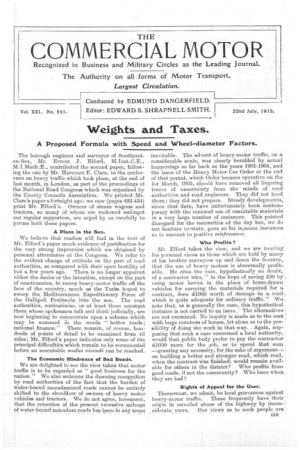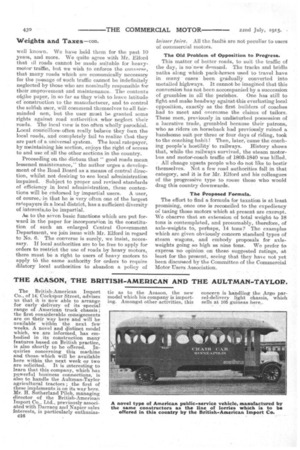Weights and Taxes.
Page 1

Page 2

If you've noticed an error in this article please click here to report it so we can fix it.
A Proposed Formula with Speed and Wheel-diameter Factors.
The borough engineer and surveyor of Southendon-Sea, Mr. ErneSt J. Elford, M.Inst.C.E., M.I.Mech.E., contributed the second paper, following the one by Mr. Harcourt E. Clare, to the conference on heavy traffic which took place, at the end of last month, in London, as part of the proceedings of the National Road Congress which was organized by the County Councils Association. We printed Mr. Clare's paper a fortnight ago: we now (pages 482-434) print Mr. Elford's. Owners of steam wagons and tractors, so many of whom are reckoned ain6ngst our regular supporters, are urged by us carefully to peruse both these papers.
A Place in the Sun.
We believe that readers will find in the text of Mr. Elford's paper much evidence of justification for the very strong impression which we obtained by personal attendance at the Congress. We refer to the evident, change of attitude on the part of road authorities, as compared with their open hostility of but a few years ago. There is no longer apparent either the desire or the intention, except on the part of reactionaries, to sweep heavy-motor traffic off the face of the country, 'much as the Turks hoped to sweep the Mediterranean Expeditionary Force off the Gallipoli Peninsula into the sea.. The road authorities. , contrariwise, or at least those amongst them whose spokesmen talk and think judicially, are now beginning to concentrate upon a scheme which may be summed in the words " better roads ; national finance." There remain, of course, hundreds of points of detail to be examined from ail sides; Mr. Elford.'s paper indicates only some of the principal difficulties which remain to be surmounted before an acceptable modus vivendi can be reached.
The Economic Hindrance of Bad Roads.
We are delighted to see the view taken that motor traffic is to be regarded as " good, business for the nation." We also welcome the dawning recognition by road authorities of the fact that the burden of water-bound macadamized roads cannot be entirely shifted to the shoulders of owners of heavy motor vehicles and tractors. We do not agree, hereanent, that the retention of the present excessive mileage of water-bound macadam roads has been in any sense inevitable. The advent, of heavy-motor traffic, on a' considerable scale, was clearly heralded by actual. happenings so far back as thoyears 1901-1904, and the issue ofthe Heavy Motor Car Order at the end of that period, which Order became operative, on the 1st March, 1905, should have removed all lingering traces of uncertainty . from the Minds of road' authorities and road.engineers. They did not heed them; they did not prepare. Steady. developments,' since that date, have unfortunately , been contemporary tiVith the renewed use of unsuitable materials' in a very large number of instances. This pointed disregard for the necessities of 'the day has, we do not hesitate to-state, gone so. far in.some instances. as to amount to positive misfeasance.
Who Profits Mr. Ellord takes the view, and we are treating: his personal views as those which are held by many: of his brother surveyors up and down the 6ountry,that the use of heavy motors is abnormally profit-, able. He cites the case, hypothetically no doubt, of a contractor Who, " in the hope of saving 50 by using motor lorries in the place of horse-drawn vehicles for carrying :the materials required for a contract, does ,1000 worth of damage .to a. road-,, which is quite adequate for ordinary traffic." We note that, as is generally the case, this hypothetical instance is not carried to an issue.,' Th alternatives are not examined. No inquiry is made as to the cost with large numbers of horses, let alone as to the possibility of doing the work in that way. ... Again, sup• posing that such a, case concerned a local authority, would that public body prefer to pay the contractor ,&1000. more for the .job, or t6 spend that sum --granting any necessity,for the sake of argument— . on building a better and stronger road, which road, when the contract was finished, would remain avail• able for others in the district? Who profits from good roads, if not the community? Who loses when , they are bad?
Rights of Appeal for the User. Thererraust, we admit, be local grievances against heavy-motor traffic. These frequently have their origin in unveiled abuse of the highway by inconsiderate users. Our views as to such people are c15 well known. We have held them for the past 10 yeans, and. more. We quite agree with Mr. Elford that UI roads cannot be made suitable for heavymotor traffic, but we wish to enforce the can,vexse that many roads which are economically necessary for the paissage of suoh traffic cannot be indefinitely neglected by those who are nominally responsible for their improvement and maintenance. The contents oft.the paper, in so far as they wish to leave latitude of 'construction to the. manufacturer, and to .control the selfish user, will commend themselves to all fairminded non; but the user must be granted some rights against road authorities whoa neglect their roads. The local view is too often wholly parochial. Local councillors :often really belieVe they bwn the local roads, and completely fail to realize that they are part of a universal system. The local ratepayer, by maintaining his section, enjoys the right of access to and use of all the other sections in the country.
Proceeding on the dictum that" good roads mean lessened maintenance," the author urges a development of the Road Board as a means of central direction, whilst not desiring to sea local administration impaired. Subject to proper and revised standards of efficiency in local administration, these contentions will be endorsed by impartial users. A user, of course, in that he is very often one of the largest ratepayers.in a local district, has a sufficient diversity of intereSts;AO be impartial.
As to the seven basic functions which are put forward in the paper for incorporation in the constitution of such an enlarged Central Government Department, we join issue with Mr. Elford in regard to No. 6. The converse is surely, we insist, necessary. If local authorities are to be free to apply for orders to restrict the use of roads by heavy motors, there must be a right to users of heavy motors to apply t5 the game authority for orders to require dilatory local authorities to abandon a policy of The Old Problem of Opposition to Progress.
This matter of better roads, to suit the traffic of the day, is no-new demand. The tracks and bridle Paths along which pack-horses used to travel have in. many cases been gradually' converted into metalled highways. It cannot be imagined that this conversion has not been accompanied by a succession of grumbles in all the parishes. One has still to fight and make headway against this everlasting local opposition, exactly as the first builders of coaches had to meet and overcome the claims of tailors. These men, previously in undisturbed possession of a lucrative trade, grumbled because their patrons, who as riders on horseback had previously ruined a handsome suit per three or four days of riding, took to the coaching habit Then, later, came the coaching people's hostility to railways_ History shows that, while the railways survived, the steam motorbus and motor-coach traffic of 1803-1840 was killed.
All change npsets people who do not like to bestir themselves. Not a few road authorities fall in that category, and it is for Mr. Elford and his colleagues of the progressive type to rouse those who would drag this country downwards.
The Proposed Formula.
The effort to find a formula for taxation is at least promising, once one is reconciled to the expediency of taxing those motors which at present are exempt. We observe that an extension of total weight to 18 tons is contemplated, and presumably, therefore, of axle-weights to, perhaps, 14 tons? The examples which are given obviously concern standard types of steam wagons, and embody proposals for axleweights going so high as nine tons. We prefer to express no opinion on these suggested ratings, at least for the present, seeing that they have not yet been discussed by the Committee of the Commercial Motor Users Association.






















